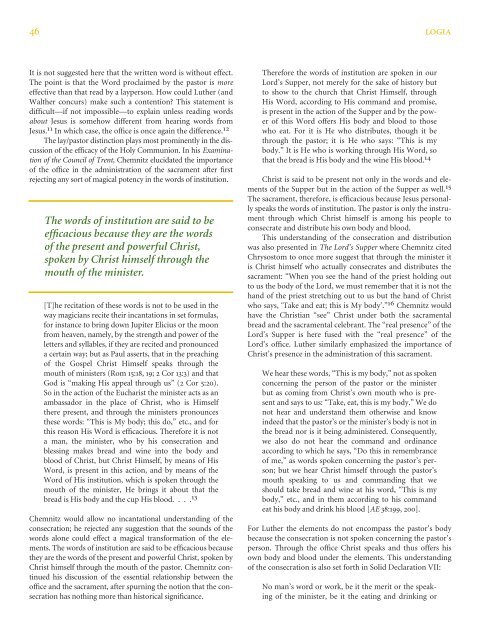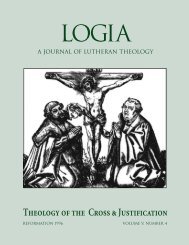ONLY PLAYING CHURCH? 45Father. Therefore you ought to say: “I saw God Himselfbaptizing and administering the Sacrament of theAltar, and I heard God preaching the Word.” . . .Whydo you refuse to listen to God, who comes in the guiseof a humble human being, who conceals Himself andresembles His beloved apostles? The word that youhear is not that of a pastor; it is God’s Word. And sinceit is God’s Word, you should be excited and happyover it. But people will not do this. They think thatthey know better [AE 22:505, 508, 509].Luther and other Lutheran fathers espoused an understandingof the ministry which was exceedingly christological. They heldthat Christ himself in, with, and under the office of the publicministry is both present and active among his people. It is preciselythis mystical union of Christ’s office and Christ’sdivine/human presence that is described in Apology VII and VIII:“[Ministers] do not represent their own persons but the personof Christ, because of the church’s call, as Christ testifies (Luke10: 16), ‘He who hears you hears me.’ When they offer the Wordof Christ or the sacraments, they do so in Christ’s place andstead.” 8 No empty representation is intended here. The pastordoes not act as a private individual but, “because of the church’sLuther and other Lutheran fathersespoused an understanding of theministry which was exceedinglychristological.call,” functions as the earthly element through which Christhimself is speaking to and working among his own people. Thecongregation does not simply hear Jesus’ words coming out ofthe pastor’s mouth like one person reading a speech written byanother. The congregation hears Jesus! He is present as speakerand actor. The pastor is only the means or instrument throughwhich Jesus personally does his work in his church. This is notto say that everything a pastor does is instrumental. In SolidDeclaration VII it is asserted that, “Nothing has the character ofa sacrament apart from the use instituted by Christ, or apartfrom the divinely instituted action’’ [SD VII, 85]. This oft-cited“Nihil rule” can be profitably applied also to the public ministry.Only those ministerial actions which are commanded byJesus can be performed instrumentally. Apart from thesedominically instituted actions, the pastor does not—indeedcannot—represent the person of Christ. The specific actions ofthe ministry, therefore, are essential. They must be conductedin accordance with the divine command. But “correct function”is not the only consideration. As has been demonstrated above,“office” is also of vital importance. The proper relationshipbetween both factors must be maintained: Jesus is present andactive under the earthly element of the human pastor when(and only when) the pastor performs Christ’s functions inChrist’s office in accordance with Christ’s commands.THE OFFICE AND SACRAMENTAL EFFICACYThis understanding of the office can help to clarify the distinctionbetween laity and pastors. The difference here is mostcertainly not a matter of spiritual or personal inferiority/superiority.The pastoral vocation in no way entails human achievementof a more spiritually advanced quality than that possibleamong the laity. Rejected, too, is any notion of the pastor as anelitist, high-level, ecclesiastical manager. Such an administrativeview of the office is only marginally christological if notaltogether unchristian; Christ came—and continues to come inthe office—not as tyrant, but as servant: “I am among you asone who serves” (Lk 22:27). Far from second-class members ofthe kingdom, laymen and laywomen are the very objects ofChrist’s continuing service through the public ministry. Hehas, in fact, promised his presence only to them (the “two orthree” gathered in his name) and not to isolated clerics separatedfrom the Christian community. The office does not andcannot exist apart from the church! The laity need only supplythe elements for Christ’s presence among them; congregationsmust provide the concrete embodiment for his presence bycalling and appointing pastors. Through these pastors, asthrough means, Christ himself personally serves his peoplewith his own word and sacraments.The distinction between laypeople and pastors, then, is simplya matter of instrumentality; a layperson functions accordingto his/her own person; a pastor functions in the office, that is, asthe instrument of Christ’s presence. The layperson might correctlyperform churchly acts, but in such actions he/she alone isthe actor. When the pastor performs these same acts in theoffice, Christ himself is the actor. This distinction can influencethe efficacy of the divinely instituted actions.The lay/pastor distinction is nowhere better understoodthan in absolution. The pastor, by virtue of the office, is able todeliver “indicative-operative absolution” in the first personsingular: “I forgive you all your sins. . . .” 9 Christ is here personallyaddressing the penitent through the instrument of thepastor—the penitent truly encounters Christ. If a member ofthe laity should speak in this manner, the offered forgivenesswould be considered as coming from the absolving individualrather than from the only begotten Son of the Father. The laitycan deliver divine pardon only in the third person singular:“God forgives you all your sins.” While it cannot be demonstratedthat one form of absolution is always or necessarilypreferable to the other, it can be demonstrated that the twoabsolutions are not identical. The office is the difference. Thelay/pastor distinction is discernible also in the application ofthe Word. In Church and Ministry, C.F.W. Walther quotedLuther on this issue.Indeed, many blurt out and say: ‘Why do we need morepastors and ministers, since we can read [the Bible] ourselvesat home?’ So they go their way in carnal security,and do not read it at home. Or even if they do read it athome, it is neither as fruitful nor as effective as the Wordis efficacious when it is publicly proclaimed by themouth of the pastor whom God has called and appointedto preach and teach it to you. 10
46 LOGIAIt is not suggested here that the written word is without effect.The point is that the Word proclaimed by the pastor is moreeffective than that read by a layperson. How could Luther (andWalther concurs) make such a contention? This statement isdifficult—if not impossible—to explain unless reading wordsabout Jesus is somehow different from hearing words fromJesus. 11 In which case, the office is once again the difference. 12The lay/pastor distinction plays most prominently in the discussionof the efficacy of the Holy Communion. In his Examinationof the Council of Trent, Chemnitz elucidated the importanceof the office in the administration of the sacrament after firstrejecting any sort of magical potency in the words of institution.The words of institution are said to beefficacious because they are the wordsof the present and powerful Christ,spoken by Christ himself through themouth of the minister.[T]he recitation of these words is not to be used in theway magicians recite their incantations in set formulas,for instance to bring down Jupiter Elicius or the moonfrom heaven, namely, by the strength and power of theletters and syllables, if they are recited and pronounceda certain way; but as Paul asserts, that in the preachingof the Gospel Christ Himself speaks through themouth of ministers (Rom 15:18, 19; 2 Cor 13:3) and thatGod is “making His appeal through us” (2 Cor 5:20).So in the action of the Eucharist the minister acts as anambassador in the place of Christ, who is Himselfthere present, and through the ministers pronouncesthese words: “This is My body; this do,” etc., and forthis reason His Word is efficacious. Therefore it is nota man, the minister, who by his consecration andblessing makes bread and wine into the body andblood of Christ, but Christ Himself, by means of HisWord, is present in this action, and by means of theWord of His institution, which is spoken through themouth of the minister, He brings it about that thebread is His body and the cup His blood. . . . 13Chemnitz would allow no incantational understanding of theconsecration; he rejected any suggestion that the sounds of thewords alone could effect a magical transformation of the elements.The words of institution are said to be efficacious becausethey are the words of the present and powerful Christ, spoken byChrist himself through the mouth of the pastor. Chemnitz continuedhis discussion of the essential relationship between theoffice and the sacrament, after spurning the notion that the consecrationhas nothing more than historical significance.Therefore the words of institution are spoken in ourLord’s Supper, not merely for the sake of history butto show to the church that Christ Himself, throughHis Word, according to His command and promise,is present in the action of the Supper and by the powerof this Word offers His body and blood to thosewho eat. For it is He who distributes, though it bethrough the pastor; it is He who says: “This is mybody.” It is He who is working through His Word, sothat the bread is His body and the wine His blood. 14Christ is said to be present not only in the words and elementsof the Supper but in the action of the Supper as well. 15The sacrament, therefore, is efficacious because Jesus personallyspeaks the words of institution. The pastor is only the instrumentthrough which Christ himself is among his people toconsecrate and distribute his own body and blood.This understanding of the consecration and distributionwas also presented in The Lord’s Supper where Chemnitz citedChrysostom to once more suggest that through the minister itis Christ himself who actually consecrates and distributes thesacrament: “When you see the hand of the priest holding outto us the body of the Lord, we must remember that it is not thehand of the priest stretching out to us but the hand of Christwho says, ‘Take and eat; this is My body’.” 16 Chemnitz wouldhave the Christian “see” Christ under both the sacramentalbread and the sacramental celebrant. The “real presence” of theLord’s Supper is here fused with the “real presence” of theLord’s office. Luther similarly emphasized the importance ofChrist’s presence in the administration of this sacrament.We hear these words, “This is my body,” not as spokenconcerning the person of the pastor or the ministerbut as coming from Christ’s own mouth who is presentand says to us: “Take, eat, this is my body.” We donot hear and understand them otherwise and knowindeed that the pastor’s or the minister’s body is not inthe bread nor is it being administered. Consequently,we also do not hear the command and ordinanceaccording to which he says, “Do this in remembranceof me,” as words spoken concerning the pastor’s person;but we hear Christ himself through the pastor’smouth speaking to us and commanding that weshould take bread and wine at his word, “This is mybody,” etc., and in them according to his commandeat his body and drink his blood [AE 38:199, 200].For Luther the elements do not encompass the pastor’s bodybecause the consecration is not spoken concerning the pastor’sperson. Through the office Christ speaks and thus offers hisown body and blood under the elements. This understandingof the consecration is also set forth in Solid Declaration VII:No man’s word or work, be it the merit or the speakingof the minister, be it the eating and drinking or
















